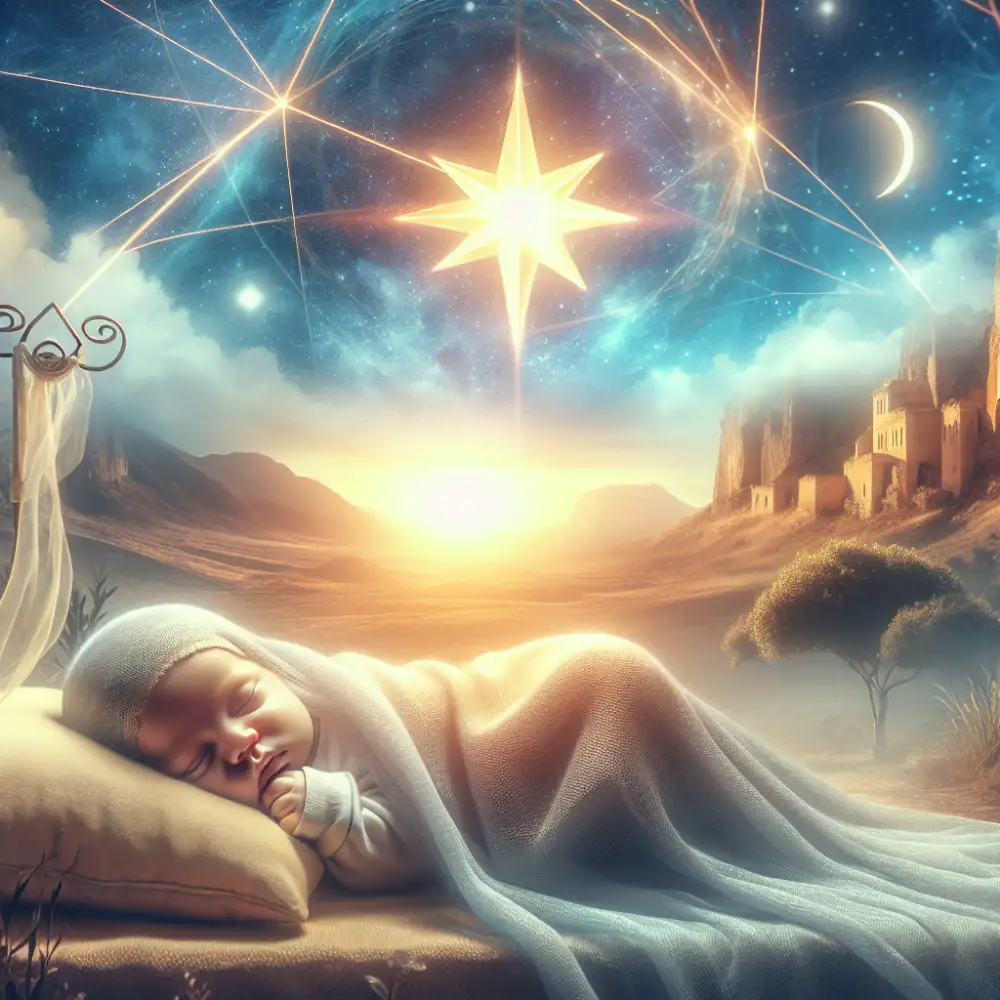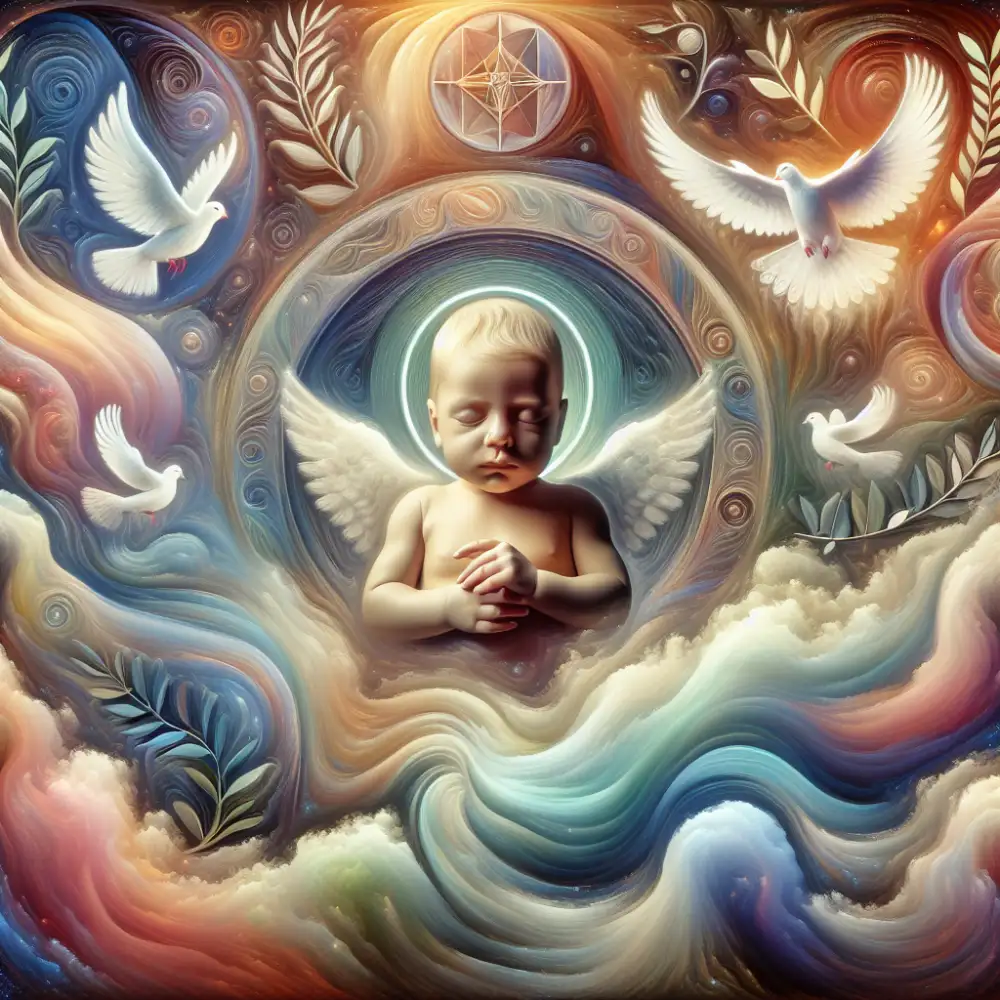Decoding Baby Dreams: A Biblical Perspective

- Dreams in Ancient Mesopotamia
- Dreams in Ancient Egypt
- Dream Interpretation in Ancient Greece and Rome
- Biblical Accounts of Dreams
- The Role of Dreams in Christianity
- Dream Interpretation in Islam
- Dreams in Medieval and Renaissance Europe
- The Enlightenment and the Scientific Revolution
- The Rise of Psychology and Dream Analysis
- Modern Perspectives on Dreams
Dreams in Ancient Mesopotamia
Ancient Mesopotamia, the cradle of civilization, held dreams in high regard. They believed dreams were divine messages, often featuring babies as potent symbols. While Mesopotamian interpretations differed from biblical ones, they offer a fascinating comparative lens.
In the Bible, dreams about babies often relate to God's promises, vulnerability, and new beginnings. For instance, the Israelites' deliverance from Egypt, symbolized by Moses' rescue from the Nile, resonates with the image of a vulnerable baby saved by divine intervention.
However, Mesopotamian dream interpretations were more nuanced, relying on the specific context of the dream. A healthy baby might signify prosperity and blessings from the gods, while a sick or crying baby could foreshadow misfortune or the need for spiritual cleansing.
Despite these differences, both cultures saw dreams as a powerful tool for understanding the divine will. Comparing these perspectives allows us to appreciate the rich tapestry of ancient beliefs surrounding dreams and their interpretations.
Dreams in Ancient Egypt
Ancient Egyptians placed great importance on dreams, viewing them as messages from the divine. They even had dream dictionaries, like the "Dream Book" found in the tomb of Ramesses II, to interpret these messages. While Egyptian and biblical dream interpretations share some similarities, they have distinct cultural and religious contexts.
The Bible presents dreams as significant events, often revealing God's will or future events. Dreams about babies in the Bible often carry symbolic weight, representing blessings, vulnerability, or new beginnings. For example, Pharaoh's dream of seven healthy cows and seven sickly cows in Genesis 41 is interpreted by Joseph as predicting seven years of abundance followed by seven years of famine. This dream, with its focus on the future of Egypt, reflects the importance of agricultural cycles in ancient societies.
However, directly correlating Egyptian dream interpretation with biblical interpretations of baby dreams requires caution. The Bible's emphasis on God's covenant with his people and the coming of the Messiah shapes its understanding of dreams. Ancient Egyptian beliefs, on the other hand, centered around a complex pantheon of gods and the afterlife.
While both cultures found meaning in dreams, their interpretations stemmed from their unique worldviews. Exploring the specific symbols and contexts within each tradition is crucial for understanding their respective approaches to dream interpretation.
Dream Interpretation in Ancient Greece and Rome
Ancient Greece and Rome, much like the biblical world, placed significant importance on dreams as potential messages from the divine. While specific interpretations varied, certain themes resonated. In the Bible, babies often symbolize innocence, divine blessing, and new beginnings.

For example, the story of Moses, placed in a basket and found by Pharaoh's daughter, connects a baby with divine purpose and deliverance. Similarly, the birth of Jesus, a pivotal moment in Christianity, emphasizes hope and salvation.
Ancient Greeks and Romans also saw babies in dreams as significant. A healthy baby could signify prosperity and good fortune, while a sickly or crying baby might forewarn of challenges or anxieties. However, unlike the Bible's more unified view, interpretations in Greco-Roman culture were influenced by various factors like the dreamer's social standing, the dream's context, and the specific deity associated with the dream.
For instance, dreaming of a baby under the protection of Hera, the goddess of marriage and family, might be interpreted differently than a dream involving Hecate, the goddess of witchcraft and transitions. While both cultures viewed dreams as potent messages, the biblical lens often focused on God's overarching plan, while Greco-Roman interpretations were more multifaceted, reflecting their more diverse pantheon and worldview.
Biblical Accounts of Dreams
The Bible is replete with instances where dreams carry profound significance, often revealing divine messages or prophecies. While the Bible doesn't offer a specific one-size-fits-all interpretation for dreams about babies, it provides a framework for understanding their symbolism.
Babies in the Bible are often symbolic of blessings, vulnerability, new beginnings, and God's covenant. For instance, the long-awaited birth of Isaac to Abraham and Sarah in their old age represented God's promise and faithfulness. Similarly, the birth of Jesus, the Son of God, marked a new covenant and the arrival of salvation.
When interpreting dreams about babies through a biblical lens, the context is crucial. A dream of holding a healthy baby could signify blessings and new beginnings in various areas of life. It could point towards a new project, a renewed relationship, or even a spiritual awakening.
Conversely, a dream featuring a crying or sick baby might indicate anxieties, fears, or unresolved issues that require attention. It could be a call to nurture one's spiritual life or address neglected areas that need care and attention.
However, it's essential to remember that dream interpretation within a biblical context is not an exact science. While these interpretations offer a starting point, seeking guidance from pastors, spiritual mentors, or biblical resources can provide a deeper understanding of the personal and spiritual significance of such dreams. Ultimately, prayerful reflection and seeking God's wisdom are paramount in discerning the true meaning of any dream.
In Biblical thought, dreams about babies are often less about literal infants and more about spiritual beginnings, divine promises, or the vulnerability of faith. They remind us that God often chooses the seemingly insignificant to do great things, just as He chose a baby born in a manger to be the Savior of the world.
Elias Davenport
The Role of Dreams in Christianity
Dreams have always held a special significance in Christianity, often seen as a way God communicates with his people. The Bible is replete with examples of dreams guiding individuals, revealing prophecies, and offering warnings. When it comes to dreams about babies, the interpretations are often tied to themes of innocence, vulnerability, new beginnings, and blessings.
In the Bible, babies are often symbolic of God's promises. For instance, the story of Isaac's birth to Abraham and Sarah in their old age signifies God's faithfulness and the fulfillment of his covenant. Similarly, the birth of Jesus, a miraculous event prophesied in the Old Testament, ushered in an era of salvation and hope. Therefore, dreaming of a baby within a Christian context can be interpreted as a positive sign from God, potentially indicating:
New beginnings: Just as a baby represents a fresh start in life, dreaming of one can symbolize a new chapter, a fresh perspective, or a new opportunity on the horizon.
Blessings and abundance: Babies are often seen as gifts from God, representing joy and abundance. A dream about a baby could signify impending blessings, whether material, emotional, or spiritual.
Spiritual growth: A baby requires nurturing and care to grow. Similarly, dreaming of a baby could be a call to focus on one's spiritual development, to nurture one's relationship with God, and to grow in faith.
Vulnerability and dependence: Babies are completely dependent on others for survival. Dreaming of a baby could be a reminder of our own dependence on God and the importance of humility and trust in our relationship with him.
However, it's crucial to approach dream interpretation with discernment and prayer. While the Bible offers guidance, it's not a dream dictionary. The specific details of the dream, the individual's personal context, and seeking God's wisdom through prayer are essential for understanding the message.
Dream Interpretation in Islam
Islam and Christianity, while sharing some common ground, have distinct beliefs regarding dream interpretation. The Bible places significance on dreams as a means of divine communication, as seen with prophets like Joseph and Daniel. Specific interpretations, like those about babies, are often derived allegorically from biblical narratives. For instance, a baby might symbolize innocence, new beginnings, or God's blessing, drawing from verses like Psalm 127:3, "Children are a heritage from the Lord, offspring a reward from him."

| Dream Symbol | Biblical Meaning | Possible Interpretation |
|---|---|---|
| Finding a baby | Gift from God, New beginnings, Promise | New opportunity, Spiritual growth, Unexpected blessing |
| Holding a baby | Responsibility, Caregiving, Love | New task or project, Nurturing a relationship, Need for emotional support |
However, Islamic teachings approach dream interpretation differently. While acknowledging dreams as a potential source of guidance, Islam doesn't directly link specific dream symbols, like babies, to fixed interpretations found in a central text like the Bible. Instead, Islamic dream interpretation relies heavily on context, personal circumstances, and the dreamer's emotional state. Muslims believe that the Quran, their holy book, emphasizes seeking guidance from Allah and learned scholars in matters of dream interpretation.
Therefore, while both faiths acknowledge the significance of dreams, their approaches to interpretation, particularly regarding specific symbols like babies, diverge based on their respective scriptures and traditions.
Dreams in Medieval and Renaissance Europe
Medieval and Renaissance Europe inherited a rich tradition of dream interpretation from the Bible and classical antiquity. Dreams about babies, in particular, held significant religious and symbolic weight. The Bible itself offers several potent examples of dreams involving infants, often imbued with prophetic meaning.
The story of Moses, for instance, features Pharaoh's dream of the infant Moses as a threat to Egypt, leading to the infanticide order and Moses' eventual destiny as the Israelites' deliverer. This narrative cemented the idea that dreams about babies could foretell significant events, even the rise and fall of rulers.
Medieval and Renaissance interpreters, drawing on biblical examples and commentaries, viewed dreams about babies through a variety of lenses. The health and appearance of the baby in the dream were crucial. A healthy, smiling baby was often seen as a positive omen, signifying good fortune, spiritual purity, or the arrival of blessings. Conversely, a sickly or crying baby could represent impending troubles, spiritual struggles, or the need for nurturing in one's life.

The act of caring for a baby in a dream also held meaning. It could symbolize the dreamer's own need for care or their responsibility towards others. It could also represent the dreamer's relationship with their own inner child or their creative potential.
However, interpreting dreams was not an exact science. Medieval and Renaissance thinkers emphasized the importance of individual context. Factors like the dreamer's age, gender, social standing, and personal circumstances all played a role in understanding the dream's message.
Ultimately, dreams about babies, much like other dreams, were seen as a way for God or the divine to communicate with individuals, offering guidance, warnings, or glimpses into the future.
The Enlightenment and the Scientific Revolution
The Enlightenment and the Scientific Revolution brought about a profound shift in Western thought, emphasizing reason and empirical observation over traditional beliefs. This shift had a significant impact on the interpretation of dreams, including those about babies.
Prior to this period, dreams held a prominent place in religious and cultural understanding, often viewed as divine messages or prophetic visions. The Bible, for instance, is replete with accounts of dreams that convey God's will or foretell future events. Dreams about babies, in particular, were often interpreted within the context of biblical narratives. The story of Moses, for example, where he is rescued as a baby from the Nile, could lend itself to interpretations of dreams about babies as symbols of salvation or deliverance.
However, the Enlightenment and the rise of scientific thinking led to a more skeptical view of dreams. Thinkers like René Descartes and John Locke emphasized the role of reason and sensory experience in understanding the world, leading to a decline in the perceived significance of dreams as sources of divine revelation or prophecy. Dreams began to be seen as products of the mind rather than messages from the divine.
While the Bible continued to be a source of inspiration and guidance for many, its interpretations, including those related to dreams, were increasingly subjected to scrutiny through the lens of reason and scientific inquiry. This shift in perspective contributed to a growing separation between the realms of faith and reason, with dreams gradually losing their biblical significance in the eyes of many.
The Rise of Psychology and Dream Analysis
The interpretation of dreams has captivated humanity for millennia, with vivid accounts documented in ancient texts like the Bible. Dreams about babies, in particular, carry profound symbolism, often representing innocence, purity, and new beginnings. In biblical narratives, dreams featuring infants hold significant weight, influencing destinies and revealing divine messages. For instance, the story of Moses's rescue from the Nile highlights the vulnerability and divine protection associated with babies in dreams.

The ascent of psychology in the late 19th century brought forth a secular approach to dream analysis, spearheaded by figures like Sigmund Freud. While not directly rooted in biblical interpretations, psychoanalysis acknowledges the profound influence of early childhood experiences on the subconscious mind. Freud's concept of the "id," representing primal instincts, aligns with the innocence and dependency often symbolized by babies.
However, it's crucial to approach dream interpretation with discernment. While the Bible offers valuable insights into the symbolic language of dreams, it's essential to avoid rigid interpretations. Dreams are highly personal, and their meaning can vary based on individual experiences and cultural contexts. Consulting biblical commentaries and seeking guidance from spiritual mentors can provide valuable perspectives on understanding the potential significance of baby dreams.
Modern Perspectives on Dreams
While modern psychology often interprets dreams about babies through the lens of personal development, anxieties, or desires for nurturing, it's fascinating to consider the biblical perspective. In the Bible, dreams held profound significance, often serving as direct messages from God. Dreams about babies, in particular, were rarely taken literally but rather symbolized spiritual rebirth, new beginnings, divine promises, or even vulnerability and innocence.
For instance, the story of Moses in the book of Exodus describes how Pharaoh, threatened by the growing number of Israelites, orders the death of all newborn Hebrew boys. The baby Moses, however, is placed in a basket and set adrift in the Nile, eventually being discovered and raised by Pharaoh's daughter. This story, while not a dream itself, highlights the biblical symbolism of babies as representing both vulnerability and divine purpose.
Similarly, the birth of Jesus, heralded by angelic visitations and dreams, signifies the ultimate new beginning and the fulfillment of God's promise of salvation. When interpreting dreams about babies through a biblical lens, it's crucial to consider the context of the dream, the emotions it evokes, and any accompanying symbols. While there's no one-size-fits-all answer, exploring the rich tapestry of biblical narratives can offer valuable insights into the spiritual significance these dreams might hold.
Published: 06. 07. 2024
Category: culture



